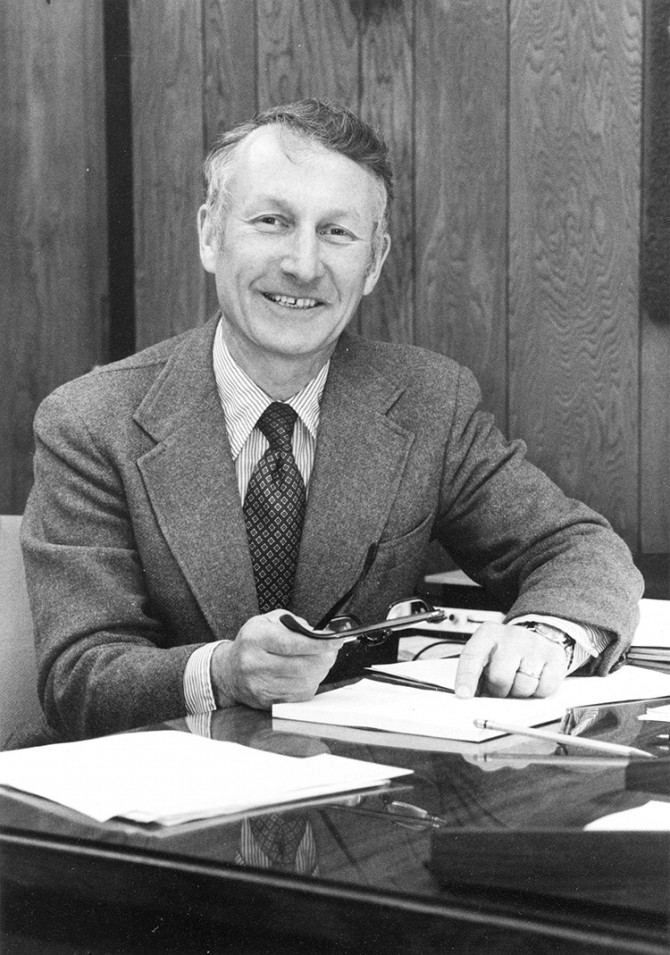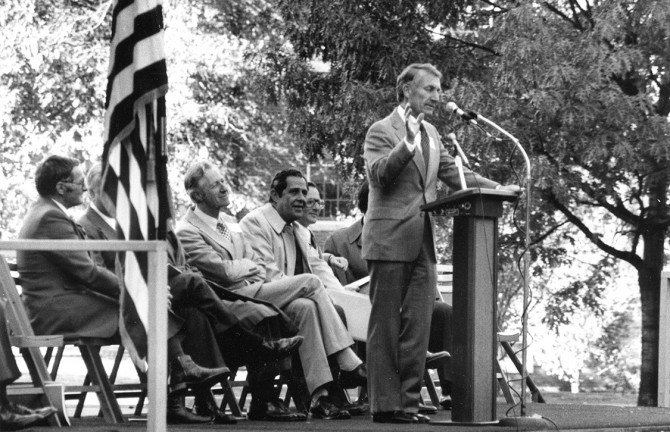
Melby in a lab in 1975.
Former Veterinary College dean Edward C. Melby Jr. dies
By Lauren Cahoon Roberts
Edward Carlos Melby Jr., DVM ’54, dean emeritus of the College of Veterinary Medicine at Cornell University, died April 22 of Alzheimer’s disease. He was 88 years old.
Dr. Melby was the sixth dean of the college, appointed Oct. 1, 1974. He served as dean until 1984, and his years at the helm of the veterinary college represented a decade of considerable growth and expansion in the size and scope of college facilities and programs.
“… (W)e have all benefited from his work expanding our research programs and in obtaining funding for new facilities that were built after his term as dean,” said Dr. Lorin Warnick, Ph.D. ’94, the Austin O. Hooey Dean of Veterinary Medicine. “His service and dedication has had significant, lasting impact on our college and the veterinary profession.”
With Melby as dean, the number of college employees grew from 468 to 820 full-time and 139 part-time student employees. The college’s budget increased from $8.6 million to more than $32 million. Over the same period, competitive grants and contracts awarded rose from $3.8 million to $21.2 million.
For many years, Melby set the stage for planning and funding a new teaching hospital and to upgrade facilities built in the 1950s. New facilities were critical to preserving the college’s standing and to meet the challenges of expanding clinical programs. He also oversaw the new building to house an enlarged State Diagnostic Laboratory to offer expanded services to practitioners and others, including a program of Equine Drug Testing and Research. He presided over the opening of the only Contagious Equine Metritis quarantine facility in New York at the time.
Administrative units at the college also saw expansion and reorganization under Melby’s leadership. In particular, the Baker Institute for Animal Health underwent a major reorganization and growth. The Department of Avian Diseases changed its name and scope to include aquatic animal medicine, and a poultry facility was built to further research on atherosclerosis, vaccines, Marek’s disease and other poultry diseases.
Born in Vermont in 1929, Melby studied at the University of Pennsylvania and University of Vermont prior to receiving his DVM degree from Cornell in 1954. After practicing privately for eight years in Vermont, he became professor and director of the Division of Comparative Medicine at The Johns Hopkins University School of Medicine.
Melby served on several national councils and boards related to laboratory animal medicine. He served as director and president of the Baltimore Zoological Society, edited four major textbooks on laboratory animal science and published more than 50 scientific papers.
“Early in his deanship, Dean Melby decided to combine the two species-oriented clinical departments into one Department of Clinical Sciences,” said emeritus professor Alexander de Lahunta DVM ’58, Ph.D. ’63. “He felt that this would facilitate the handling of the department functions that were similar for the two species-oriented departments.”
Donald Henry Lein, DVM ’57, emeritus professor of pathology and theriogenology, said Melby’s advocacy was instrumental in helping Lein and his team establish the Cornell Equine Park. “He was cognizant of what we were doing with the facility and was excited for us to use it for both teaching and research,” said Dr. Lein, who noted that Melby was also key in setting up the equine drug testing program. “He had great foresight. He really sold it to the state and the racing commission.”
Melby was also an important voice in creating a barrier in the Northeast to raccoon rabies in the late 1990s, Lein said: “When we started the program, Dr. Melby got in contact and helped us a great deal in Vermont and New Hampshire. He was excited about it and his help was significant. It reminded me of being back at Cornell and him helping us with the diagnostic lab.”
Melby left the college in 1984 and to become vice president for research and development and vice president for science and technology at SmithKline Beecham Laboratories in Philadelphia, from which he retired to his family farm in Vermont.
Lauren Cahoon Roberts is assistant director of communications with the College of Veterinary Medicine.
Media Contact
Get Cornell news delivered right to your inbox.
Subscribe


